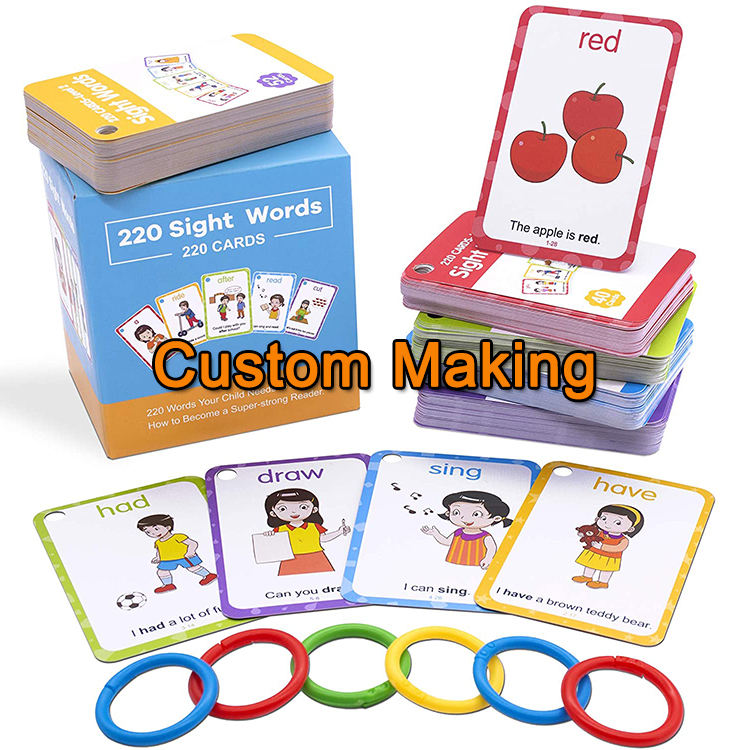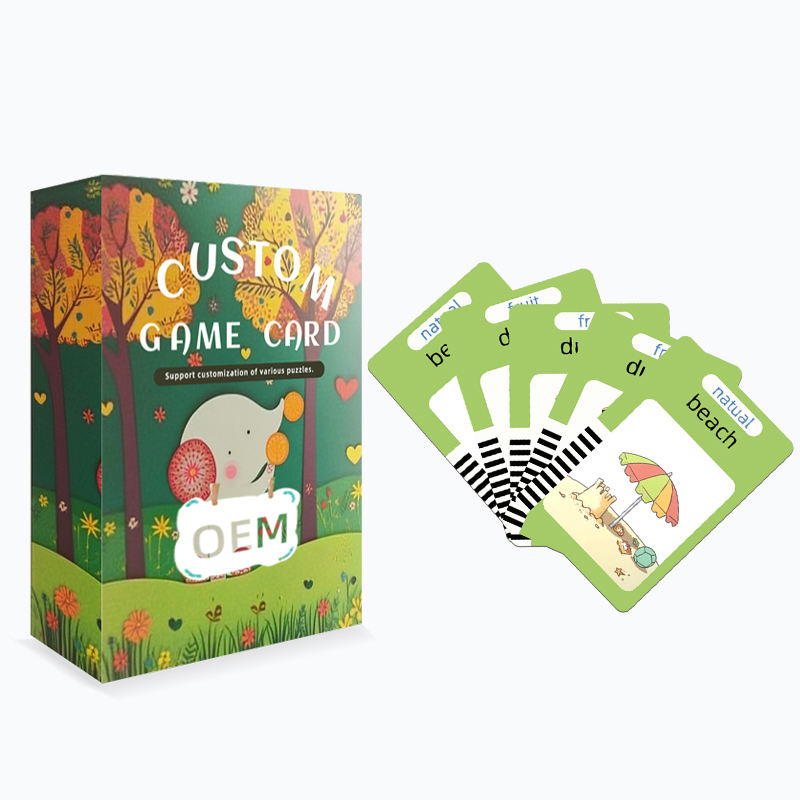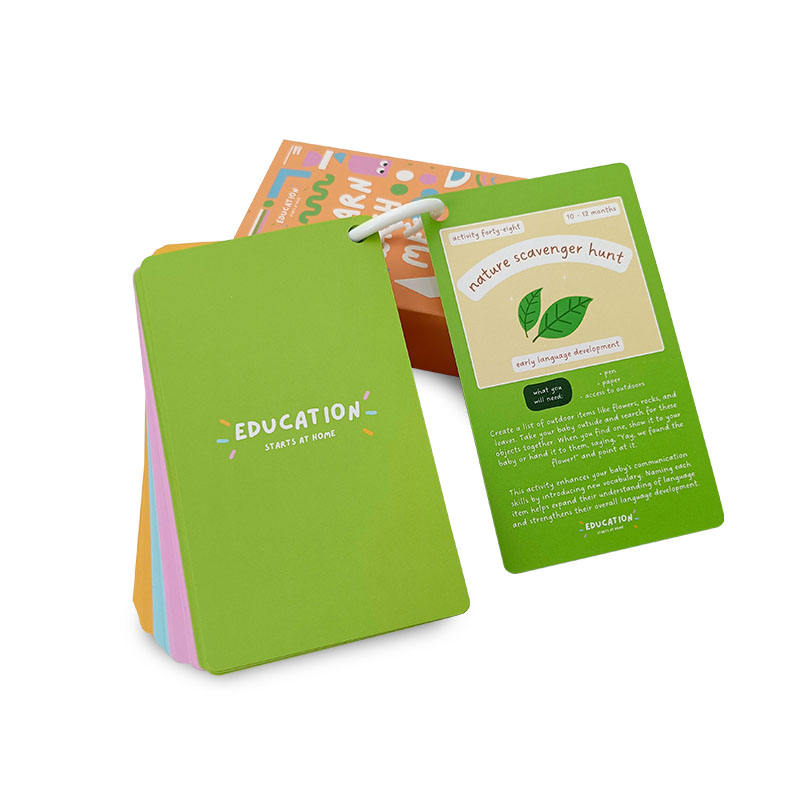Content Menu
● What Are Learning Cards and How Do They Work?
● Why Are Learning Cards So Effective?
● How Do Learning Cards Enhance Engagement Across Age Groups?
● What Are the Key Applications of Learning Cards in Education?
● What Unique Advantages Does XingKun Offer for Customized Learning Cards?
>> 1. Comprehensive Customization Options
>> 2. Premium Durability and Quality Control
>> 3. Flexible Order Quantities and Fast Turnaround
>> 4. Seamless Integration with Digital Solutions
>> 5. Dedicated Support and Innovation Consultation
● How Can XingKun’s Learning Cards Benefit Different Sectors?
>> Educational Institutions
>> Tutoring and Test Prep Centers
>> Corporate Training
>> Healthcare and Therapy
>> Retail, Travel, and Hospitality
● What Is the Future of Learning Cards in Education?
● Frequently Asked Questions About Learning Cards
>> Q1: What makes learning cards suitable for different age groups?
>> Q2: How can organizations customize learning cards with XingKun?
>> Q3: What quality standards do XingKun learning cards adhere to?
>> Q4: Are learning cards effective in training remote employees?
>> Q5: How do learning cards enhance test preparation and review?
Learning cards have become an increasingly popular resource in both traditional classrooms and digital learning environments, offering a versatile and engaging approach to acquiring new knowledge and skills. But what makes learning cards stand out as the ultimate tool in modern education? This article explores their benefits, applications across age groups, and how XingKun’s customized products offer distinct advantages for organizations and individuals alike.

What Are Learning Cards and How Do They Work?
Learning cards—sometimes called flashcards or study cards—are small, portable pieces of material used for teaching and reviewing information. Typically composed of sturdy paper or plastic, each card contains a concise piece of information, such as a question, vocabulary term, concept, equation, or image. Learners interact with these cards by reading the prompt on one side and recalling or reviewing the corresponding answer or explanation found on the reverse.
Teachers, students, and professionals employ learning cards to break down complex information into manageable, bite-sized facts. The act of physically handling cards and repeatedly cycling through them aids in memory retention, making learning cards especially useful for language acquisition, exam preparation, corporate training, and early childhood education.
Why Are Learning Cards So Effective?
Learning cards leverage proven principles of cognitive psychology, particularly active recall and spaced repetition. Active recall refers to the practice of drawing information out of memory rather than simply recognizing it, which strengthens neural pathways and improves long-term retention. Spaced repetition spaces out review sessions over time, prompting the brain to reinforce connections at optimal intervals.
When learners use cards to self-test, flip cards over, and shuffle through stacks, they engage deep mental processes that enhance understanding. This method contrasts with passive reading or listening, where information is absorbed but not necessarily retained. The adaptability of learning cards—customizable for any subject, age, or skill level—makes them accessible to a wide array of users.
How Do Learning Cards Enhance Engagement Across Age Groups?
One reason learning cards are so widely adopted is their versatility. For children, cards can introduce playful colors and illustrations, turning education into an interactive game. Teachers and parents use cards for phonics, math operations, science facts, and social-emotional learning. For adults, learning cards streamline exam study, professional certification prep, vocabulary building, and even complex reasoning.
Cards work equally well in individual and group settings. Students study alone, but teachers also facilitate peer learning with card exchanges, quizzes, or collaborative games. Learning cards can foster healthy competition, boost confidence, and make learning social.
What Are the Key Applications of Learning Cards in Education?
Learning cards are used in numerous educational scenarios:
Language Acquisition: Vocabulary, grammar, definitions, idioms, pronunciation cues.
Test Preparation: Practice questions, equations, historical dates, concepts.
Early Childhood Education: Colors, shapes, numbers, letters, storytelling prompts.
Professional Training: Industry terminology, compliance facts, process steps.
Special Needs Education: Multi-sensory support, simplified instructions, personal cues.
Their compact format and targeted content allow learners to review anywhere and anytime, maximizing flexibility and reinforcing microlearning principles.

What Unique Advantages Does XingKun Offer for Customized Learning Cards?
As customization becomes more important in education and training, XingKun specializes in designing and producing learning cards tailored to organizational goals and learner needs. Here are distinctive benefits that set XingKun’s products apart:
1. Comprehensive Customization Options
XingKun offers clients the ability to specify every aspect of their learning cards, including size, shape, material, print color, layout, and protective coatings. This ensures that each set of cards aligns exactly with a company's branding, learning objectives, and audience preferences.
2. Premium Durability and Quality Control
All cards produced by XingKun are constructed using industry-leading materials, which guarantee longevity and resistance to wear and tear. Cards remain vivid and structurally sound even after extensive use, making them ideal for classroom environments, travel, and repeated handling.
3. Flexible Order Quantities and Fast Turnaround
Whether a client requires a small batch for pilot testing or large-scale production for nationwide distribution, XingKun accommodates flexible quantities without sacrificing speed or quality. Clients benefit from rapid prototyping, efficient bulk processing, and global logistics support.
4. Seamless Integration with Digital Solutions
XingKun’s design team can help organizations create cards that pair with digital applications, QR codes, augmented reality, or e-learning platforms, extending the reach and functionality of traditional card-based learning.
5. Dedicated Support and Innovation Consultation
Clients working with XingKun receive expert project management, design input, and ongoing support to optimize learning card efficacy. Feedback is encouraged at each stage, enabling clients to iterate, scale, and innovate with confidence.
How Can XingKun’s Learning Cards Benefit Different Sectors?
Educational Institutions
Schools can create curriculum-aligned learning cards for different grade levels, subjects, and supplemental programs. Interactive cards motivate students and facilitate differentiated instruction.
Tutoring and Test Prep Centers
Standardized test prep becomes more effective with custom cards reflecting exam formats, official questions, and adaptive difficulty.
Corporate Training
Companies use tailored cards for onboarding, compliance, process refinement, and ongoing professional development, improving knowledge transfer and retention.
Healthcare and Therapy
Custom cards help patients and clients learn medical concepts, rehabilitation steps, or cognitive therapy exercises in a portable, accessible format.
Retail, Travel, and Hospitality
Industry professionals use cards for product training, language support, customer service skills, and cultural orientation.
What Is the Future of Learning Cards in Education?
With advances in printing, digital integration, and personalization, learning cards continue to evolve as essential teaching tools. The ongoing focus on active learning, flexible modalities, and individualized instruction ensures learning cards remain relevant and impactful.
XingKun’s commitment to innovation and client collaboration positions its products as cornerstones of educational transformation. As organizations seek scalable, effective, and engaging solutions, customized learning cards offer a proven means to boost outcomes in any setting.

Frequently Asked Questions About Learning Cards
Q1: What makes learning cards suitable for different age groups?
A: Learning cards can be designed with age-appropriate language, visuals, and content complexity. For young children, colorful images and simple words engage attention; for adults, advanced terminologies and nuanced concepts challenge understanding.
Q2: How can organizations customize learning cards with XingKun?
A: Clients provide specifications for content, design, size, and features, while XingKun’s team guides materials selection and production processes, ensuring that each card set matches the intended learning objectives and branding.
Q3: What quality standards do XingKun learning cards adhere to?
A: XingKun uses premium materials and advanced printing techniques to produce durable cards that withstand frequent handling and environmental exposure, passing stringent quality inspections before shipping.
Q4: Are learning cards effective in training remote employees?
A: Yes, learning cards facilitate self-paced study, group interaction during virtual sessions, and integration with digital training platforms, making them effective tools for remote skill-building.
Q5: How do learning cards enhance test preparation and review?
A: Cards promote active recall, encourage repeated practice, and allow learners to identify and focus on weak areas, resulting in better retention and improved test performance.
































